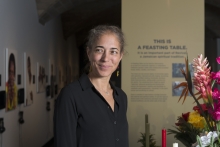Deborah Thomas embeds herself in communities stricken by violence to chronicle the humanity revealed during the aftermath.
"The most difficult interviews were the children. It was 2012, and the filming of Deborah Thomas’ documentary, Four Days in May, was underway in Tivoli Gardens, the site of one of the most violent events in modern Jamaican history.
“After talking to the kids, we were all pretty under it. I thought, ‘I can’t do this anymore. Maybe this is wrong,’” says Thomas. “I mentioned that to one of the people from the community and he said, ‘People are going to break down in the studio, but then on the way home they’re always saying how much better they feel having talked about it. Otherwise we bury it.’”
Thomas is a Renaissance woman by any definition. An educator, author, filmmaker, artist, and professional dancer, she has spent her adult life working with victims of violence, using her expertise and artistry to examine the humanity within tragedy. Deborah Thomas embeds herself in communities stricken by violence to chronicle the humanity revealed during the aftermath.
he most difficult interviews were the children. It was 2012, and the filming of Deborah Thomas’ documentary, Four Days in May, was underway in Tivoli Gardens, the site of one of the most violent events in modern Jamaican history.
“After talking to the kids, we were all pretty under it. I thought, ‘I can’t do this anymore. Maybe this is wrong,’” says Thomas. “I mentioned that to one of the people from the community and he said, ‘People are going to break down in the studio, but then on the way home they’re always saying how much better they feel having talked about it. Otherwise we bury it.’”
Thomas is a Renaissance woman by any definition. An educator, author, filmmaker, artist, and professional dancer, she has spent her adult life working with victims of violence, using her expertise and artistry to examine the humanity within tragedy.
Read the full story in PennToday

 The Program in Gender, Sexuality, and Women’s Studies
The Program in Gender, Sexuality, and Women’s Studies
